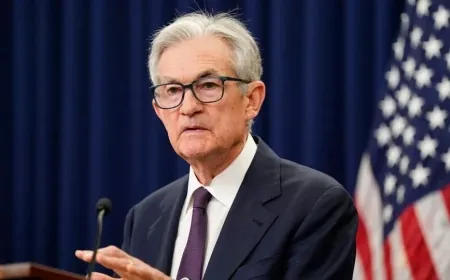Israel Lowers 2024 Growth Forecast Due to Gaza Conflict
Israel's 2024 growth forecast drops due to the Gaza conflict. Learn how the ongoing war affects Israel's economy, including GDP, deficit, and spending

Israel’s finance ministry has dramatically revised its growth forecast for 2024, now projecting an increase of just 1.1% instead of the earlier 1.9%. This adjustment underscores the severe economic impact of the prolonged conflict with Hamas, which began in early October. The forecast for 2025 has also been reduced to 4.4%, down from 4.6%.
This significant downgrade reflects a tougher economic environment, with Israel’s economy set to experience its slowest growth since around 2009, excluding the peak of the COVID-19 pandemic. The ongoing conflict has put considerable strain on various sectors, including construction, agriculture, and tourism, all of which have suffered noticeable declines.
The war’s financial toll is evident, with Israel’s defense spending and fiscal deficit soaring. The government estimates that the total cost of the conflict by the end of next year will be around $66 billion, which represents over 12% of the country’s GDP. This expenditure has led to higher bond yields and increased government borrowing, highlighting investor unease.
By August, the conflict had already led to expenditures of nearly 97 billion shekels ($25.9 billion), pushing the fiscal deficit up to 8.3% of GDP. This sharp rise in borrowing has been one of the largest in Israel’s history. Despite these challenges, the finance ministry is optimistic that the deficit will decrease to 6.6% by year-end.
In a notable shift, Fitch Ratings has downgraded Israel’s credit rating from A+ to A, reflecting concerns that the conflict might persist into 2025 and potentially involve additional regional tensions. Fitch also forecasts a possible increase in the fiscal deficit to 7.8% of GDP this year, compared to 4.1% in 2023.
Diplomatic efforts are ongoing to resolve the conflict, with US President Joe Biden, alongside leaders from Qatar and Egypt, working to broker a cease-fire between Israel and Hamas. The White House is expected to present new proposals soon to address the stalemate in negotiations. The finance ministry’s projections assume that tensions with Hezbollah will not escalate into a larger-scale conflict, although this remains a significant concern.
Despite the economic difficulties, Israel’s central bank is likely to maintain its interest rate at 4.5% for the foreseeable future. Recent inflation rates have risen to 3.2%, surpassing the target range of 1%-3%. The Bank of Israel’s Deputy Governor, Andrew Abir, has expressed doubts about the possibility of interest rate cuts before the end of the year, given the current economic conditions.
































































